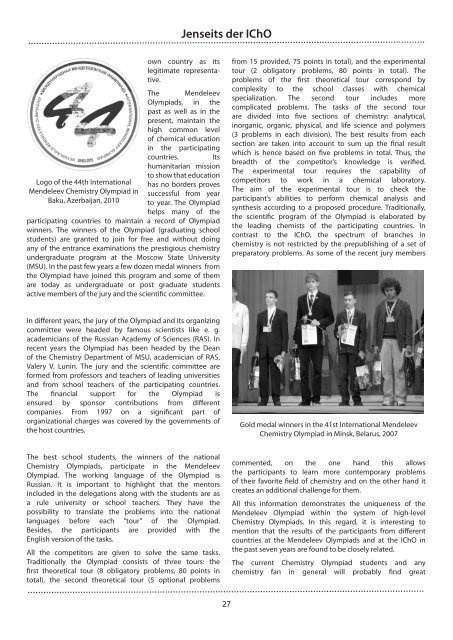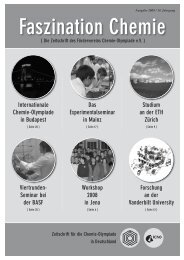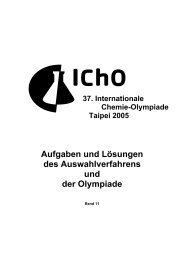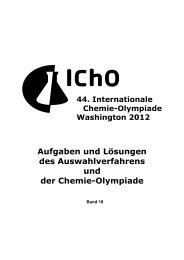Faszination Chemie - FChO
Faszination Chemie - FChO
Faszination Chemie - FChO
- TAGS
- faszination
- chemie
- fcho
- www.fcho.de
Sie wollen auch ein ePaper? Erhöhen Sie die Reichweite Ihrer Titel.
YUMPU macht aus Druck-PDFs automatisch weboptimierte ePaper, die Google liebt.
Logo of the 44th International<br />
Mendeleev Chemistry Olympiad in<br />
Baku, Azerbaijan, 2010<br />
Jenseits der IChO<br />
own country as its<br />
legitimate representative.<br />
The Mendeleev<br />
Olympiads, in the<br />
past as well as in the<br />
present, maintain the<br />
high common level<br />
of chemical education<br />
in the participating<br />
countries. Its<br />
humanitarian mission<br />
to show that education<br />
has no borders proves<br />
successful from year<br />
to year. The Olympiad<br />
helps many of the<br />
participating countries to maintain a record of Olympiad<br />
winners. The winners of the Olympiad (graduating school<br />
students) are granted to join for free and without doing<br />
any of the entrance examinations the prestigious chemistry<br />
undergraduate program at the Moscow State University<br />
(MSU). In the past few years a few dozen medal winners from<br />
the Olympiad have joined this program and some of them<br />
are today as undergraduate or post graduate students<br />
active members of the jury and the scientific committee.<br />
In different years, the jury of the Olympiad and its organizing<br />
committee were headed by famous scientists like e. g.<br />
academicians of the Russian Academy of Sciences (RAS). In<br />
recent years the Olympiad has been headed by the Dean<br />
of the Chemistry Department of MSU, academician of RAS,<br />
Valery V. Lunin. The jury and the scientific committee are<br />
formed from professors and teachers of leading universities<br />
and from school teachers of the participating countries.<br />
The financial support for the Olympiad is<br />
ensured by sponsor contributions from different<br />
companies. From 1997 on a significant part of<br />
organizational charges was covered by the governments of<br />
the host countries.<br />
The best school students, the winners of the national<br />
Chemistry Olympiads, participate in the Mendeleev<br />
Olympiad. The working language of the Olympiad is<br />
Russian. It is important to highlight that the mentors<br />
included in the delegations along with the students are as<br />
a rule university or school teachers. They have the<br />
possibility to translate the problems into the national<br />
languages before each “tour” of the Olympiad.<br />
Besides, the participants are provided with the<br />
English version of the tasks.<br />
All the competitors are given to solve the same tasks.<br />
Traditionally the Olympiad consists of three tours: the<br />
first theoretical tour (8 obligatory problems, 80 points in<br />
total), the second theoretical tour (5 optional problems<br />
27<br />
from 15 provided, 75 points in total), and the experimental<br />
tour (2 obligatory problems, 80 points in total). The<br />
problems of the first theoretical tour correspond by<br />
complexity to the school classes with chemical<br />
specialization. The second tour includes more<br />
complicated problems. The tasks of the second tour<br />
are divided into five sections of chemistry: analytical,<br />
inorganic, organic, physical, and life science and polymers<br />
(3 problems in each division). The best results from each<br />
section are taken into account to sum up the final result<br />
which is hence based on five problems in total. Thus, the<br />
breadth of the competitor’s knowledge is verified.<br />
The experimental tour requires the capability of<br />
competitors to work in a chemical laboratory.<br />
The aim of the experimental tour is to check the<br />
participant’s abilities to perform chemical analysis and<br />
synthesis according to a proposed procedure. Traditionally,<br />
the scientific program of the Olympiad is elaborated by<br />
the leading chemists of the participating countries. In<br />
contrast to the IChO, the spectrum of branches in<br />
chemistry is not restricted by the prepublishing of a set of<br />
preparatory problems. As some of the recent jury members<br />
Gold medal winners in the 41st International Mendeleev<br />
Chemistry Olympiad in Minsk, Belarus, 2007<br />
commented, on the one hand this allows<br />
the participants to learn more contemporary problems<br />
of their favorite field of chemistry and on the other hand it<br />
creates an additional challenge for them.<br />
All this information demonstrates the uniqueness of the<br />
Mendeleev Olympiad within the system of high-level<br />
Chemistry Olympiads. In this regard, it is interesting to<br />
mention that the results of the participants from different<br />
countries at the Mendeleev Olympiads and at the IChO in<br />
the past seven years are found to be closely related.<br />
The current Chemistry Olympiad students and any<br />
chemistry fan in general will probably find great






